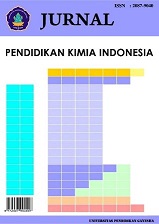AKREDITATION
*) Jurnal Pendidikan Kimia Indonesia (JPK) Is Accredited Sinta 2 by The Ministry for Research, Technology and Higher Education (RISTEKDIKTI)
As an international, multi-disciplinary, peer-refereed journal, the scope of this journal is in learning and instruction area which provides a platform for the publication of the most advanced scientific researches in the areas of learning, development, instruction and teaching at Chemistry Education. The journal welcomes original empirical investigation. The papers may represent a variety of theoretical perspectives and different methodological approaches. They may refer to any age level, from infants to adults and to a diversity of learning and instructional settings, from laboratory experiments to field studies. The major criteria in review and the selection process concerns the significance of the contribution to the area of learning and instruction. Instruction, learning and teaching, curriculum development, learning environment, teacher education, educational, technology, and educational development at Chemistry Education
This journal provides immediate open access to its content on the principle that making research freely available to the public supports a greater global exchange of knowledge.
Jurnal Pendidikan Kimia Indonesia (JPKI) has been covered by these following indexing services.
Jurnal Pendidikan Kimia Indonesia is regularly published two times a year (April and October).
The papers published in the Jurnal Pendidikan Kimia Indonesia will be considered to retract in the publication if :
The mechanism of retraction follows the Retraction Guidelines of the Committee on Publication Ethics (COPE), which can be accessed at https://publicationethics.org/files/retraction%20guidelines.pdf.
Papers submitted to the Jurnal Pendidikan Kimia Indonesia will be screened for plagiarism using Turnitin plagiarism detection tools. Jurnal Pendidikan Kimia Indonesia will immediately reject papers leading to plagiarism or self-plagiarism. Before submitting articles to reviewers, those are first checked for similarity/plagiarism tool, by a member of the editorial team. The papers submitted to the Jurnal Pendidikan Kimia Indonesia must have a similarity level of less than 20% (Exclude Bibliography), and the similarity score to each source is no more than 3%.
Plagiarism is the exposure of another person’s thoughts or words as though they were your own, without permission, credit, or acknowledgment, or because of failing to cite the sources properly. Plagiarism can take diverse forms, from literal copying to paraphrasing the work of another. To accurately judge whether an author has plagiarized, we emphasize the following possible situations:
PRINT EDITION


